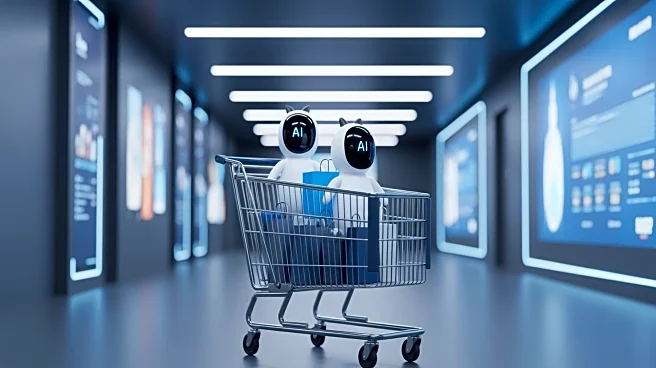What's Happening?
The Boston Consulting Group (BCG) has released a report indicating a significant increase in the use of generative AI (GenAI) tools among shoppers, particularly during year-end sales events. The report,
based on a survey of over 10,000 consumers across ten countries, highlights that 48% of consumers have used or plan to use GenAI for shopping, marking a nine percentage point increase from the previous year. GenAI tools like ChatGPT and Google AI are becoming integral in guiding consumers through purchasing decisions, offering product comparisons, and finding the best deals. This trend is consistent across various demographics, including Gen X and baby boomers, who are increasingly adopting AI as a shopping assistant. Retailers are encouraged to adapt by ensuring their product data is structured and machine-readable to remain visible in AI-driven shopping environments.
Why It's Important?
The rise of GenAI in shopping represents a transformative shift in consumer behavior, with significant implications for retailers. As AI tools become more trusted and widely used, retailers must adapt their strategies to maintain visibility and competitiveness. This includes optimizing product data for AI platforms and integrating AI into their omnichannel strategies. The shift towards AI-driven shopping could lead to changes in consumer loyalty and purchasing patterns, potentially impacting retailers' earnings and market share. Retailers that fail to adapt may risk losing direct contact with consumers and becoming less relevant in an increasingly AI-driven marketplace.
What's Next?
Retailers are expected to develop brand-owned AI agents and enhance their presence on third-party AI platforms to stay competitive. They may also need to strengthen direct customer relationships through loyalty programs and personalized offers to reduce reliance on AI intermediaries. As AI-driven shopping continues to grow, retailers will need to focus on 'agent engine optimization' to ensure their products are discoverable in AI ecosystems. This shift could redefine the retail landscape, with those adapting to AI trends gaining a competitive edge.
Beyond the Headlines
The integration of AI in shopping is not just a technological shift but also a cultural one, as it changes how consumers interact with brands and make purchasing decisions. The trust in AI tools among older generations suggests a broader acceptance of technology, which could lead to further innovations in retail and consumer engagement. The move towards AI-driven shopping also raises questions about data privacy and the ethical use of AI in influencing consumer behavior.









